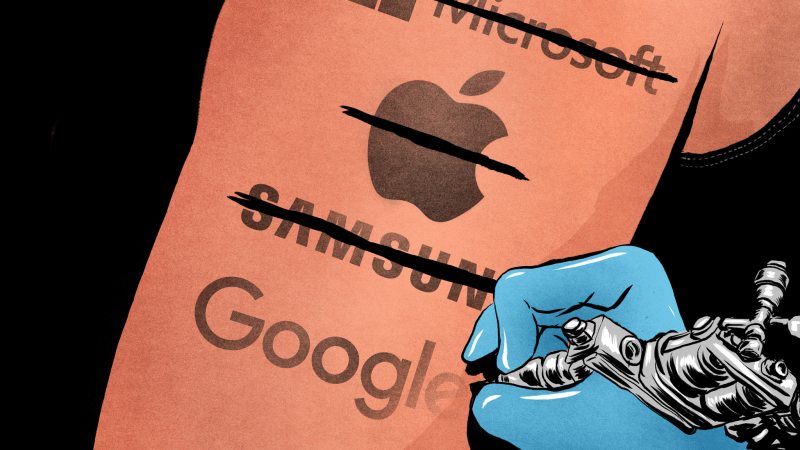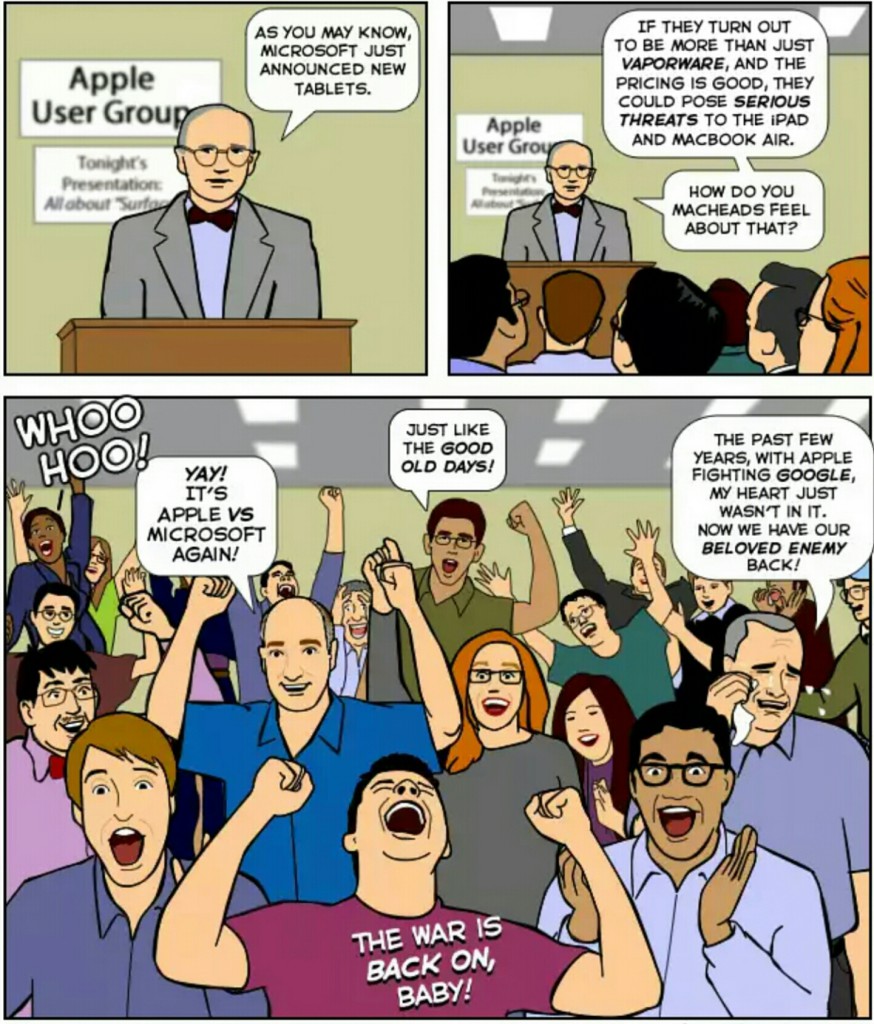A detailed analysis of the consequences of attachment to a particular brand from the point of view of psychology.

Every year after the announcement of the next top device, the user community is divided into two camps: those who are lined up. to buy a new 'thing' and those who loudly scold her. In both cases, people become victims of their innocence. Brand loyalty poisons and dulls, regardless of whether the attitude towards it is positive or negative.
Victims of the Monopoly Game
While watching the recent announcement Apple and exchanging ironic comments, I caught a glimpse of Shannon Morse, host and producer of Hak5 and TekThing. I expressed the opinion that brand loyalty is not so good, to which I received a clear argument in support: “Loyalty forces you to submit to the manufacturer's monopoly. If you are open to choice, you can get what you really need, and not what the manufacturers dictate to us. ' She's absolutely right. By enrolling ourselves in the ranks of the apologists of a particular brand / product, we find ourselves in the shackles of a 'voluntary monopoly', within which you trust the manufacturer in the aspect of providing the right user experience at the right time without violating the secrecy of private information, overpaying for services and with due regard to to the client.
You may have had a similar experience. We all have a friend who only buys products Apple because they are 'just better looking' or 'more reliable'. However, all these arguments are just a mask, in fact, 'everything is working as it should and I don't have to bother with it'. As soon as you try this mentality on yourself, it is very difficult to return to the previous warehouse. And after you are trapped, Apple will introduce a new laptop without USB ports and say: 'You don't need USB, you better try this port! If you really need it, we can sell you an adapter. For $ 79. '
Trusting one company with all our needs, we cut ourselves off from the ability to make the right decisions about what, when and why we use. Instead, loyalty forces us to distort existing needs depending on what the company offers, thereby dictating to us what to buy.
Loyalty encourages bigotry
The whole point of a brand from a market perspective is to nudge people to form an emotional relationship with a product. Companies don't just want you to defend the products they love, they depend on it. They do their best to force us to identify ourselves with the food we buy, the drinks we drink, the computers we use, etc. They really need this attachment, it is it that makes us buy products from the same company again.
The 2012 Nintendo Wii U announcement is a great example of how a brand dictates a purchase. The authors of the console reviews unanimously complained about the modest number of games and other problems. It would be logical to assume that people will wait and refuse to buy. But no. Negative reviews did not prevent people from lining up in long lines on a cold winter evening in order to buy one of the consoles in the store. Some preferred to set up online trackers, informing them of interesting offers and then sleep in parking lots, spend hours on the road in pursuit of the coveted Wii U.
People waited in the night because this is Nintendo. They trusted the company and the brand. They felt like they were part of something bigger, despite all the facts. And, yes, U won its laurels, but it took two years, loads of games, and multiple discounts all over the place. Buying a console now would be a smart choice. Buying at that time would have made you an 'early adopter' or, more politely, a 'free beta tester'.

There is a reason why we are caught in these 'nets'. The psychology of brand loyalty is rooted in social identity theory – the concept that our self-image is associated with our social group. We identify with people buying the same things. On top of that, we are subject to the Diderot effect, according to which our purchases directly affect our sense of self. We try a new product, are happy with it and suddenly feel close to the owners of the same thing, because they 'understand' us.
Of course, this attachment makes us buy another product from our favorite company and support them, because they produce good things. Yes, this is undoubtedly true, but other companies also produce good products. We are exposed to prejudices that guide our choices and we rationalize our decisions as correct in any context, for all people and entities. I like the point.
More than one study has proven the relationship between buying and self-identification. At a certain stage, this is normal, there is nothing strange about being happy with the purchases and the role they play. But when 'I'm glad I bought this, just what I need' turns into 'Thanks to this product / company, my image is higher' or, worse, into 'Whoever chooses another product doesn't understand anything / is stupid', then that's it, 'the trap slammed shut.' Now you are a weapon in the battle to sell the company and humiliate users of competitors' products.
Loyalty doesn't make products better
This psychology not only contributes to the development of warm feelings in relation to a particular company. It also promotes the development of hatred towards rivals or any alternative in the same area in the mind. But companies don't need rivals.

Blind loyalty and blind hatred do not allow us to demand better products from our beloved company. If they all learn about how ideal they are and how awful their competitors are, then companies will have no reason to improve and innovate. If their consumers can't be skeptics, why should they be? Competition is important, it is the engine of development. Where would iPhone be if Android hadn't promoted iOS in terms of multitasking or notification center? Where would Android be if iOS had not been released and redefined the smartphone market?
Loyalty encourages blind consumption
Every company's marketing and PR strategy relies to some extent on free online warriors. Regardless of the name ('brand ambassadors', 'street team' or 'fanatic fans'), these people are marketing the company without knowing it. Get it right, enthusiasm is great and learning the best product will only be beneficial. It happens that enthusiasm turns into violent arguments with people with different preferences and in eight-hour lines for the coveted purchase, and the company gets another 'soldier' into its ranks. Moreover, the service is free.
In these holy wars on the net, victory is not ours. This is not our choice. We are capable of more.
Original article by Alan Henry
Elir: This kind of psychology is quite universal, be it a laundry detergent, a smartphone or a clothing brand. By building worked out logical sequences, we often move away from elementary moral norms and succumb to someone's behavioral patterns. Online battles, as a rule, are not constructive; very quickly, the parties to the dispute turn to insults. I agree with the author that we can be above this, the holivars are fed up with it. Describing his feelings and actions from buying new things that match the donated robe, Diderot warns against 'contamination' of sudden luxury. It is not she who determines a person and his moral character. Or is this the position of an idealist?
